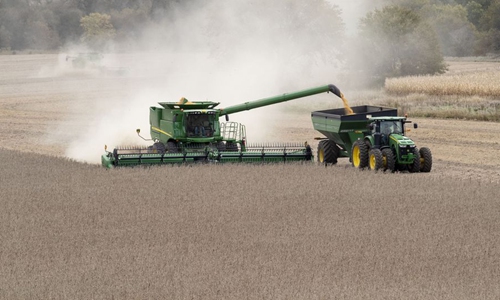HOME >> SOURCE
China takes more measures to implement phase one deal with US
Source:Globaltimes.cn Published: 2020/4/8 0:51:19

A combine and a grain cart work in a soybean field of Pellett family's farm in Atlantic, a small city in Iowa, the United States, Oct. 16, 2019. Photo: Xinhua
The Chinese government on Tuesday rolled out more measures to enable companies to increase purchases of US products, signaling Beijing's commitment to carry out the phase one trade agreement reached in January despite disruptions caused by the coronavirus pandemic and strained diplomatic ties.
The Customs Tariff Commission of the State Council, China's cabinet, said in a statement that it would further simplify procedures for businesses to apply for tariff exemptions for US products. Under the new rules, companies can apply for tariff exemptions for product purchases for one month or for a three-month period, according to the statement.
Exemptions for certain products and purchases will be accelerated and companies can also make adjustments to already submitted applications, the commission said, adding that the move was aimed at "better helping businesses and allowing the market to play its role."
"This is a normal move to implement the [phase one trade agreement]," Gao Lingyun, an expert at the Chinese Academy of Social Sciences who advises the Chinese government on trade issues, told the Global Times on Tuesday, adding that the move could help more businesses to buy US products by improving the platform.
The move on Tuesday also followed a slew of measures taken by Chinese officials to implement the phase one deal, which went into effect in mid-February. Under the agreement, China agreed to increase its purchases of US products, including agricultural and manufactured goods, by $200 billion over the next two years.
But as the coronavirus pandemic causes serious disruptions to normal life and economic activities in both China and the US, some doubts have been expressed about China's ability and willingness to carry out the agreement, though both sides have so far maintained that they are sticking to the plan.
Asked about the trade agreement at a press briefing on Monday, US President Donald Trump said that China was buying US products and US farmers could see some support from China's purchase of US agricultural products.
A senior Chinese official also indicated at the weekend that China has been increasing imports of US soybeans and will further increase such imports.
"As the China-US phase one economic and trade agreement reached earlier this year will be implemented, imports of US soybeans could increase this year," Wei Baigang, director of the Development Planning Department of the Ministry of Agriculture and Rural Affairs (MARA), told reporters on Saturday.
Wei said that China's import of soybeans increased 14.2 percent year-on-year to 13.51 million tons in the first two months of the year, but he did not reveal the amount of imports from the US. However, Reuters reported on Tuesday that US soybean exports to China fell 78 percent year-on-year to 471,761 tons.
US farmer groups and analysts have told the Global Times that soybean exports to China are usually low at this time of year because it is the planting season in the US and exports will improve later in the year.
Wei said that China will monitor the impact of the epidemic on the global soybean market and will coordinate with major exporters to minimize the impact, while taking further measures to facilitate trade.
However, there are still risks for not just soybean trade but the whole phase one agreement, given the still-worsening epidemic in the US that could dampen the US supply chain for products covered in the phase one deal, analysts said. Rising hostility in the US toward China could also risk the implementation of the phase one agreement, as well as cooperation between the two countries in other areas, analysts added.
"[China's latest move] is a show of its stance on the agreement, but if the US cannot supply [the products] then it's their own problem," said Gao, the trade adviser.
Posted in: ECONOMY